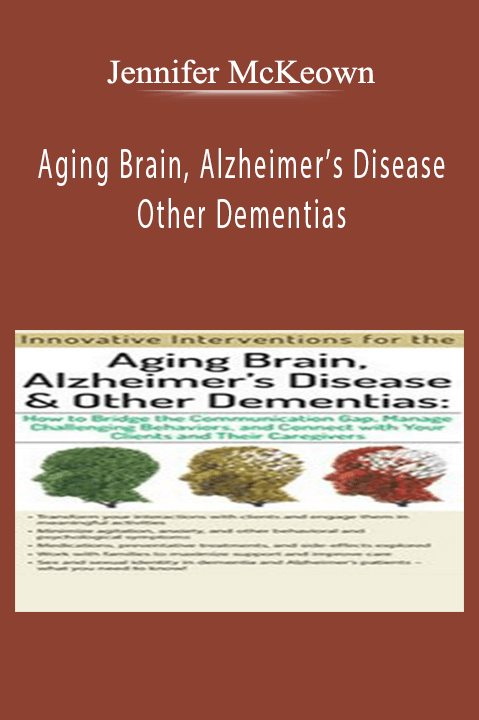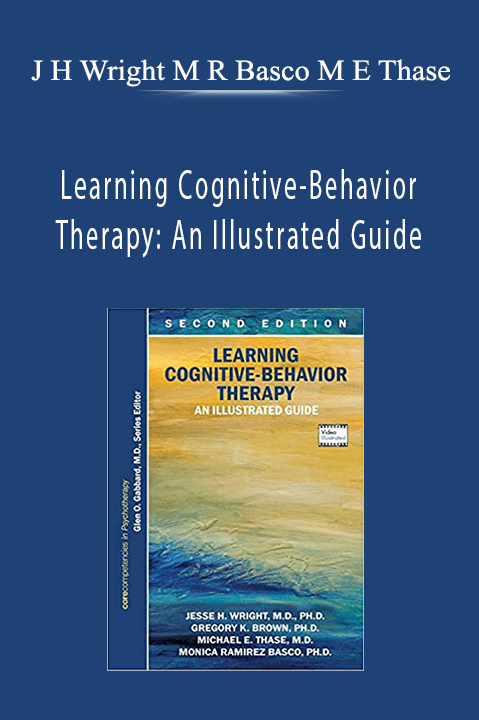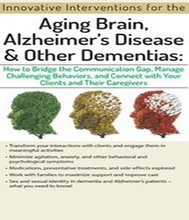Aging Brain, Alzheimer’s Disease and Other Dementias: Bridge the Communication Gap, Manage Challenging Behaviors and Connect with Your Clients and Their Caregivers – Jennifer McKeown
- Transform your interactions with clients and engage them in meaningful activities
- Minimize agitation, anxiety, and other behavioral and psychological symptoms
- Medications, preventative treatments, and side-effects explored
- Work with families to maximize support and improve care
- Sex and sexual identity in dementia and Alzheimer’s patients – what you need to know!
The challenges and frustrations of working with people suffering with dementia can feel overwhelming. You worry because your clients’ needs aren’t clearly communicated and you need a better way to reach them. Difficult behavioral issues like agitation and anxiety often get in the way of your ability to provide care. Interventions and techniques that worked yesterday, don’t work today. And you even need to work with patients and their spouses regarding uncomfortable personal issues like sex and sexuality that they didn’t teach you about at school.
As a Licensed Mental Health Counselor and Director of Social Work for a skilled nursing facility, Jennifer McKeown has spent the last decade immersed in the Alzheimer’s and dementia field. Through her work with hundreds of dementia sufferers and their families, she has acquired the hands-on skills, techniques, and solutions you need to handle the challenges, answer your questions, and provide the best care possible.
Join Jennifer as she walks you through what works and what doesn’t with geriatric patients facing Alzheimer’s disease and other dementias. Return to your practice better able to evaluate, assess and effectively intervene in depression, anxiety, aggression and other behavioral and psychological symptoms of dementia. Broaden your understanding of medications, preventative treatments, and the impact of their side-effects on older patients. Walk away with innovative tools to overcome communication deficiencies and a game plan for maximizing client support in partnership with caregivers and family members.
Practical and understandable, Jennifer’s animated and interactive delivery style will draw you into the dire nature of dementia and leave you feeling empowered and eager to use your new skills!
Don’t wait, sign up for this multifaceted seminar today!
Key benefits of attending:
- Communication tools to transform your interactions with clients and engage them in meaningful activities.
- Sidestep problem behaviors – identify and understand triggers for delusions, hallucinations, and anxiety.
- Up-to-date behavioral interventions to manage agitation and elopement, reduce risks, and allow you to adapt treatment as the disease changes.
- Learn how to handle sex and sexual identity in dementia with confidence and sensitivity.
- Tips and tactics for working in partnership with families to improve care.
- Distinguish between different types of dementias by accurately identifying manifestations of each type and understand how these differences impact diagnosis and prognosis.
- Determine an approach to evaluate and assess depression, delirium, hallucinations, and other behavioral pathologies in demented patients.
- Employ journaling, aromatherapy, touch and other research-informed interventions in your treatment plans for depression, anxiety, and agitation in clients with dementia.
- Maximize support for your clients with tips and tactics that nurture collaboration with and within families, foster the therapeutic alliance, and improve care.
- Analyze appropriate and inappropriate sexual behaviors in relationships where one member suffers from dementia, and know when and how to assess for ability to consent.
- Explore the ethics of dementia with an in-depth look at end-of-life issues and elder abuse and be able to correlate how the ethics of dying impacts the clinician, client, and their family.
Get Aging Brain, Alzheimer’s Disease and Other Dementias: Bridge the Communication Gap, Manage Challenging Behaviors and Connect with Your Clients and Their Caregivers of author Jennifer McKeown
- Diagnosis, Prognosis and Pharmacological Treatment
- Types of dementia and pseudo-dementia
- Alzheimer’s disease
- Diagnosis and prognosis
- Stages/Presentation
- Risk factors/Genetics
- Assessment tools
- Medications and side-effects explored
- Current medications
- Preventative treatments
- Bridge the Communication Gap with Innovative Approaches
- When traditional communication is replaced by behaviors
- Person centered: Gathering beliefs and values
- Effective tips for communicating with dementia patients
- Find the meaning behind the gesture
- How to avoid arguments
- What questions to ask, and how to ask them
- Meaningful activities that connect
- Music and memory
- Photo books, boxes
- Postcards and other innovative tools
- Behavioral and Psychological Symptoms: Triggers and Intervention Techniques
- Depression and anxiety
- Journaling
- Music and memory
- Aromatherapies
- Agitation – triggers, pain and care planning
- Music
- Aromatherapies
- Bright Light therapy
- Delusions and hallucinations
- Potential causes and complications
- Wandering as a stress reliever
- Elopement -reducing risks and action steps
- Adapting as the disease changes
- Depression and anxiety
- Work with Caregivers: Family as Members of the Care Team
- Family dynamics
- Normalizing change
- Validation, empathy and active listening
- Providing 1:1 counseling to families
- Anticipatory grief counseling
- Caregiver self-assessment scale
- Caregiver burnout and where to go for help
- Sex, Intimacy and Sexual Identity in Dementia and Alzheimer’s Disease
- Sexual manifestation and expression
- Dementia and marital sex
- Assessment tools for ability to consent
- Sexual expressiveness and interventions for dignity
- LGBTQ Culture
- Needs and competencies
- SAGE: Advocacy & Services for LGBTQ Elders
- The Ethics of Dementia
- End of life issues
- Power of Attorney
- Elder abuse
Get Instant Access Aging Brain, Alzheimer’s Disease and Other Dementias: Bridge the Communication Gap, Manage Challenging Behaviors and Connect with Your Clients and Their Caregivers – Jennifer McKeown at Offimc.click Now!
Sale page_https://catalog.pesi.com/item/31479/
Archive: https://archive.fo/qlhmQ
Delivery Information
- Upon ordering the product, a delivery email with download instructions will be sent immediately to you so that you may download your files. If you log in (or create an account) prior to purchase you will also be able to access your downloads from your account dashboard.
- It is a digital download, so please download the order items and save them to your hard drive. In case the link is broken for any reason, please contact us and we will resend the new download link to you.
- If you don't receive the download link, please don’t worry about that. We will update and notify you as soon as possible from 8:00 AM – 8:00 PM (UTC+8).
- Please Contact Us if there are any further questions or concerns you may have. We are always happy to assist!








10 reviews for Jennifer McKeown – Aging Brain, Alzheimer’s Disease and Other Dementias: Bridge the Communication Gap, Manage Challenging Behaviors and Connect with Your Clients and Their Caregivers
There are no reviews yet.